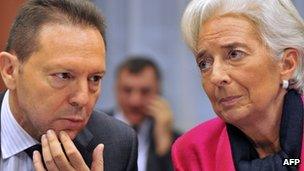Greece secures delay but pain remains
- Published
- comments

IMF chief Christine Lagarde has called Greece's targets 'ambitious'
The Greek drama, which has preoccupied Europe for almost three years, continues. Another chapter is turned. The problem lies unresolved.
The eurozone's finance ministers have given Greece another two years to make the cuts promised. It is a small reward for the Greek Prime Minister Antonis Samaras for arm-twisting through the Greek parliament another round of tax rises and spending cuts.
What the finance ministers did not do was agree on releasing further funding for Greece. And without the next tranche of 31bn euros ($39.3bn; £24.7bn) in loans, Greece faces bankruptcy. The decision has been postponed until 20 November.
Almost certainly, the deal will be done and Greece will get its money. The reason is political.
The decision to help Greece - come what may - was taken in early August. German Chancellor Angela Merkel put out the word that the possibility of Greece leaving the euro was off the table. She told her political allies to stop talking about it. French President Francois Hollande had told her he would not allow a Greek exit.
Above all, in a German election year, Mrs Merkel wants the Greek crisis to subside.
There are outstanding issues: more time means more money. There was a pretence that it didn't, but it does - between 25bn and 30bn euros. That will have to be addressed and the final deal will have to be passed by several national parliaments.
A second issue is what they call debt sustainability; can Greece meet the target for reducing its debts?
The current target is for the debt-to-GDP ratio to be 120% by 2020. That has now slipped to 2022, although the International Monetary Fund (IMF) insists they should stick to the original date.
Almost no-one believes this target - whatever the date - can be met. The current debt-to-GDP ratio is approaching 190%. The return to growth would have to be not just swift but record-breaking to reach the targets. So, sooner or later, Greece will either need more funding or a re-structuring of its debt.
There is further pause for thought: the EU and the IMF have consistently under-estimated the impacts of spending cuts on the real economy.
It has been far greater than envisaged.
And yet, with the latest measures that passed through the Greek parliament this week, more cuts are on the way. The head of the IMF, Christine Lagarde, whilst praising the Greeks for a strong resolve to implement the new programme, called it "very ambitious".
A second concern is political instability. The governing coalition in Greece is fragile. Sooner or later, another election will have to be held and anti-austerity parties may well come out the winner.
Important reforms are being embraced in Greece but the "return to sustainable growth" spoken of by Jean-Claude Juncker, who heads the Eurogroup of finance ministers - is very difficult to imagine. And patience in Greece with austerity is all but exhausted.
So a chapter turns. Not much more.